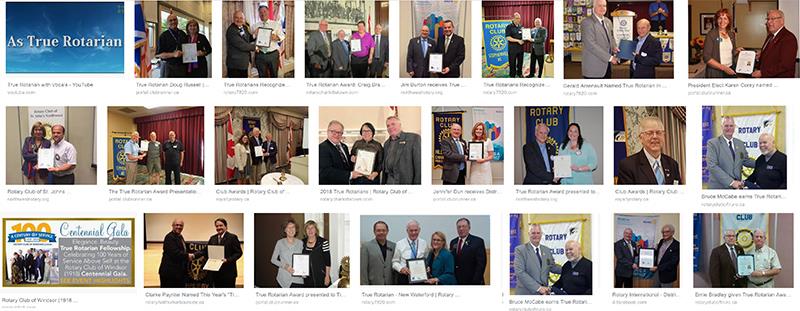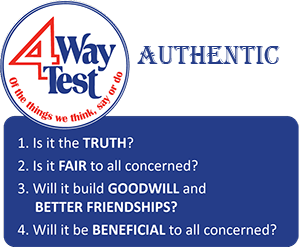Words like “True’, or ‘Authentic’ applied to human endeavours are problematic whether applied to a member of a political party, fans of a sports team, a religious faith or a service organisation like Rotary.
My first experience with the concept wasn’t a pleasant one. Shortly after joining Rotary and being a bit of a social media junkie, it didn’t take long for me to discover LinkedIn’s Rotary International Discussion Group. I found it a great place to learn of the diversity of practices in Rotary especially as it applied to weekly meeting practices.
Nor did it take long for me to offer an opinion which elicited a charge of “not being a true Rotarian”. It became particularly acute when I posted an opinion piece in the spring of 2012 titled It’s Time for a Woman President in 2014-15!
The reaction was profoundly disturbing and revealed the depth of division which remained within Rotary 25 years after Rotary had formally admitted women as members. The discussion lasted for six months and generated over 1800 comments. Some comments were hostile, and the RI staff monitor removed them from the discussion.
By that time, I had also experienced one Rotarian who felt I had no right to express opinions about Rotary because I hadn’t been a Rotarian long enough and couldn’t possibly know enough to speak wisely. He did the same to many others often with language not suitable for the occasion.
Words such as ‘True’ or ‘Authentic’ seem particularly problematic qualifiers as they imply there is only one correct way to be a Rotarian while at the same time casting anyone who isn’t a Rotarian in that exact same way as ‘untrue’ or ‘inauthentic”: a false Rotarian, a Rotarian in name only or something less than a Rotarian.
Such terms are not a good practice for Rotary, especially as we are an organisation undergoing a period of much change. Old traditions and habits get cast aside. New forms of clubs, with less onerous and costly practices, are approved and promoted. Rotary’s new branding parameters even after five years are still ignored by many. Attendance is no longer a measure of ‘engagement’, even though we still by habit track it. At the same time, we strongly resist tracking our service hours, a far more accurate measure, in support of our Rotarian Strategic goals.
As I approach my 10th anniversary of being a Rotarian, it has come as a bit of a surprise, as I researched this topic to discover we have an award called the “True Rotarian Award”. On the surface, it appears benign as it is an attempt to honour a Rotarian who best exemplifies the Four-way Test. There is even a song on YouTube called The True Rotarian.

Screengrab as a result of a Google Image Search under the term"True Rotarian"
One definition of the True Rotarian Award calls it “the lifeblood of Rotary” and even acknowledges there is a place for dissent “This Rotarian speaks with frankness yet always with sincerity and sympathy.” On the other hand, it has been my observation that one of the characteristics of very active Rotarians is a propensity to avoid any criticism of Rotary in any way. It has also been my experience, as in the example shared above, frankness generates little empathy or understanding.
Another problematic characteristic of the True Rotarian Award is “a person who conducts him/herself following the 4-way Test at all times, who is humble, does not flatter wealth or boast of his/her own possessions or achievements.” If ever there was a statement which describes how you get to be president of Rotary, this is it.
It is my belief that this practice is a barrier to women who are qualified to be President. They dare not appear to be too ambitious or covetous of the position. It is, I think, one of the ways by which men have maintained their hegemony over the position.
None of this is new, however. Paul Harris, in his 1935 book The Rotarian Age, describes the break-off group called the Altrurians (All True Rotarians). Elsewhere Darrell Thompson, in his history of the Four-Way Test describes how the test could “stir bitter conflict for those who try to balance integrity and ambition” and how “serious-minded Rotarians, not to mention skeptics and negative thinkers, …view The Four-Way Test as a simplistic philosophy of dubious worth, contradictory meaning and unrealistic aims.”
Thompson’s history also provides an example which Rotary should emulate with a change in its Manual of Procedure on the selection of its President, one with which I have previously taken exception, but which currently finds unreflective support among the majority of Rotarians, even among women.
The Four-Way Test was written by Rotarian Herbert J. Taylor, not for Rotary but for a company he had bought into and assumed the CEO position. Darrell writes “…at Club Aluminum in the 1930s, everything was measured against The Four-Way Test. First, the staff applied it to advertising. Words like “better,” “best,” “greatest” or “finest” were dropped from ads and replaced by factual descriptions of the product. Rotary’s MoP describes the selection of Rotary’s president as “the best” candidate. No “factual description” exists. As Herbert J Taylor knew and practised “best” violates the ethical standard imposed by the Four-Way Test, yet as an organisation, we violate that standard every time the selection committee chooses the next nominee.
Thompson concludes his paper with “The Four-Way Test offers a fresh and positive vision in the midst of a world full of tension, confusion and uncertainty.” “Tension, confusion, and uncertainty” have only intensified since Thompson wrote those words. Driven by change the world retreats further into authoritarianism and loyalty to tribal alliances and values as an antidote to relieve the “tension, confusion and uncertainty”.
Even with the Four-way Test, Rotary is at great risk, as it changes in profound ways in order to grow and thrive, of creating a divisive “Altrurian” renaissance. I would suggest we stop issuing the “True Rotarian Award.” There are many alternative wordings available, Exceptional Service Award, Service Above Self Award, or Rotarian of Excellence Award are a few that come to mind. I addition, we should revisit our Constitution and Manual of Procedures at all levels to ensure there are no “wiggle room” words such as "best" which permit old prejudices to linger long after they should have died.
